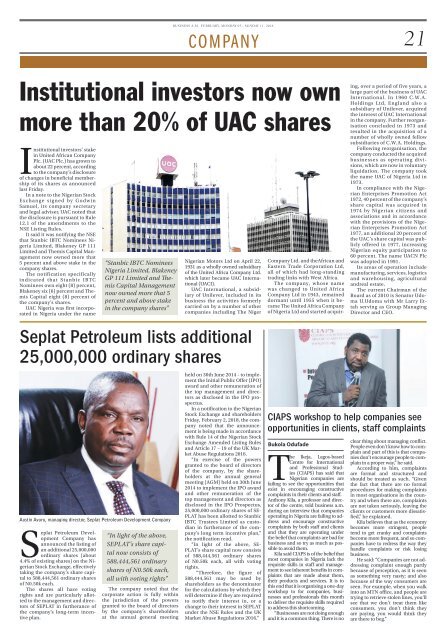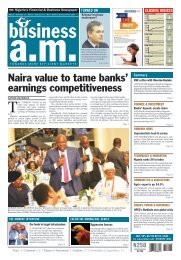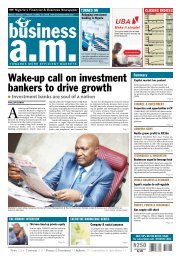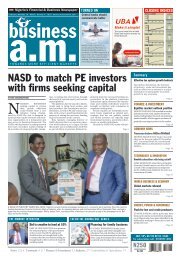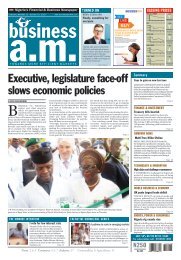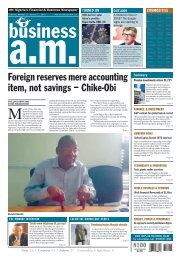You also want an ePaper? Increase the reach of your titles
YUMPU automatically turns print PDFs into web optimized ePapers that Google loves.
BUSINESS A.M. FEBRUARY, MONDAY <strong>05</strong> - SUNDAY 11, 20<strong>18</strong><br />
COMPANY<br />
Hedge Funds<br />
21<br />
Institutional investors now own<br />
more than 20% of UAC shares<br />
Institutional investors’ stake<br />
in United African Company<br />
Plc. (UAC Plc.) has grown to<br />
about 22 percent, according<br />
to the company’s disclosure<br />
of changes in beneficial membership<br />
of its shares as announced<br />
last Friday.<br />
In a note to the Nigerian Stock<br />
Exchange signed by Godwin<br />
Samuel, its company secretary<br />
and legal adviser, UAC noted that<br />
the disclosure is pursuant to Rule<br />
12.1 of the amendments to the<br />
NSE Listing Rules.<br />
It said it was notifying the NSE<br />
that Stanbic IBTC Nominees Nigeria<br />
Limited, Blakeney GP 111<br />
Limited and Themis Capital Management<br />
now owned more that<br />
5 percent and above stake in the<br />
company shares.<br />
The notification specifically<br />
indicated that Stanbic IBTC<br />
Nominees own eight (8) percent,<br />
Blakeney six (6) percent and Themis<br />
Capital eight (8) percent of<br />
the company’s shares.<br />
UAC Nigeria was first incorporated<br />
in Nigeria under the name<br />
“Stanbic IBTC Nominees<br />
Nigeria Limited, Blakeney<br />
GP 111 Limited and Themis<br />
Capital Management<br />
now owned more that 5<br />
percent and above stake<br />
in the company shares”<br />
Nigerian Motors Ltd on April 22,<br />
1931 as a wholly owned subsidiary<br />
of the United Africa Company Ltd.<br />
which later became UAC International<br />
(UACI).<br />
UAC International, a subsidiary<br />
of Unilever, included in its<br />
business the activities formerly<br />
carried on by a number of other<br />
companies including The Niger<br />
Company Ltd. and theAfrican and<br />
Eastern Trade Corporation Ltd,<br />
all of which had long-standing<br />
trading links with West Africa.<br />
The company, whose name<br />
was changed to United Africa<br />
Company Ltd in 1943, remained<br />
dormant until 1955 when it became<br />
The United Africa Company<br />
of Nigeria Ltd and started acquiring,<br />
over a period of five years, a<br />
large part of the business of UAC<br />
International. In 1960 C.W.A.<br />
Holdings Ltd, England also a<br />
subsidiary of Unilever, acquired<br />
the interest of UAC International<br />
in the company. Further reorganisation<br />
concluded in 1973 and<br />
resulted in the acquisition of a<br />
number of wholly owned fellow<br />
subsidiaries of C.W.A. Holdings.<br />
Following reorganisation, the<br />
company conducted the acquired<br />
businesses as operating divisions,<br />
which are now in voluntary<br />
liquidation. The company took<br />
the name UAC of Nigeria Ltd in<br />
1973.<br />
In compliance with the Nigerian<br />
Enterprises Promotion Act<br />
1972, 40 percent of the company’s<br />
share capital was acquired in<br />
1974 by Nigerian citizens and<br />
associations and in accordance<br />
with the provisions of the Nigerian<br />
Enterprises Promotion Act<br />
1977, an additional 20 percent of<br />
the UAC’s share capital was publicly<br />
offered in 1977, increasing<br />
Nigerian equity participation to<br />
60 percent. The name UACN Plc<br />
was adopted in 1991.<br />
Its areas of operation include<br />
manufacturing, services, logistics<br />
and warehousing, agricultural<br />
andreal estate.<br />
The current Chairman of the<br />
Board as of 2010 is Senator Udoma<br />
U.Udoma with Mr Larry Ettah<br />
serving as Group Managing<br />
Director and CEO.<br />
Seplat Petroleum lists additional<br />
25,000,000 ordinary shares<br />
Austin Avuru, managing director, Seplat Petroleum Development Company<br />
Seplat Petroleum Development<br />
Company has<br />
announced the listing of<br />
an additional 25,000,000<br />
ordinary shares (about<br />
4.4% of existing shares) on the Nigerian<br />
Stock Exchange, effectively<br />
taking the company’s share capital<br />
to 588,444,561 ordinary shares<br />
of N0.50k each.<br />
The shares all have voting<br />
rights and are particularly allotted<br />
to the management and directors<br />
of SEPLAT in furtherance of<br />
the company’s long-term incentive<br />
plan.<br />
“In light of the above,<br />
SEPLAT’s share capital<br />
now consists of<br />
588,444,561 ordinary<br />
shares of N0.50k each,<br />
all with voting rights”<br />
The company noted that the<br />
corporate action is fully within<br />
the jurisdiction of the powers<br />
granted to the board of directors<br />
by the company’s shareholders<br />
at the annual general meeting<br />
held on 30th June 2014 - to implement<br />
the Initial Public Offer (IPO)<br />
award and other remuneration of<br />
the top management and directors<br />
as disclosed in the IPO prospectus.<br />
In a notification to the Nigerian<br />
Stock Exchange and shareholders<br />
Friday, February 2, 20<strong>18</strong>, the company<br />
noted that the announcement<br />
is being made in accordance<br />
with Rule 14 of the Nigerian Stock<br />
Exchange Amended Listing Rules<br />
and Article 17 – 19 of the UK Market<br />
Abuse Regulations 2016.<br />
“In exercise of the powers<br />
granted to the board of directors<br />
of the company, by the shareholders<br />
at the annual general<br />
meeting (AGM) held on 30th June<br />
2014 to implement the IPO award<br />
and other remuneration of the<br />
top management and directors as<br />
disclosed in the IPO Prospectus,<br />
25,000,000 ordinary shares of SE-<br />
PLAT has been allotted to Stanbic<br />
IBTC Trustees Limited as custodian<br />
in furtherance of the company’s<br />
long term incentive plan,”<br />
the notification read.<br />
“In light of the above, SE-<br />
PLAT’s share capital now consists<br />
of 588,444,561 ordinary shares<br />
of N0.50k each, all with voting<br />
rights.<br />
“Therefore, the figure of<br />
588,444,561 may be used by<br />
shareholders as the denominator<br />
for the calculations by which they<br />
will determine if they are required<br />
to notify their interest in, or a<br />
change to their interest in SEPLAT<br />
under the NSE Rules and the UK<br />
Market Abuse Regulations 2016.”<br />
CIAPS workshop to help companies see<br />
opportunities in clients, staff complaints<br />
Bukola Odufade<br />
The Ikeja, Lagos-based<br />
Centre for International<br />
and Professional Studies<br />
(CIAPS) has said that<br />
Nigerian companies are<br />
failing to see the opportunities that<br />
exist in encouraging constructive<br />
complaints in their clients and staff.<br />
Anthony Kila, a professor and director<br />
of the centre, told business a.m.<br />
during an interview that companies<br />
operating in Nigeria are failing to address<br />
and encourage constructive<br />
complaints by both staff and clients<br />
and that they are operating under<br />
the belief that complaints are bad for<br />
business and so try as much as possible<br />
to avoid them.<br />
Kila said CIAPS is of the belief that<br />
most companies in Nigeria lack the<br />
requisite skills in staff and management<br />
to see inherent benefits in complaints<br />
that are made about them,<br />
their products and services. It is to<br />
this end that it is organising a one-day<br />
workshop to for companies, businesses<br />
and professionals this month<br />
to deliver the requisite skills required<br />
to address this shortcoming.<br />
“Businesses are not doing enough<br />
and it is a common thing. There is no<br />
clear thing about managing conflict.<br />
People even don’t know how to complain<br />
and part of this is that companies<br />
don’t encourage people to complain<br />
in a proper way,” he said.<br />
According to him, complaints<br />
are formal and structured and<br />
should be treated as such. “Given<br />
the fact that there are no formal<br />
procedures for making complaints<br />
in most organisations in the country<br />
and when there are, complaints<br />
are not taken seriously, leaving the<br />
clients or customers more dissatisfied,”<br />
he explained.<br />
Kila believes that as the economy<br />
becomes more stringent, people<br />
tend to get cranky and complaints<br />
become more frequent, and so companies<br />
have to redress the way they<br />
handle complaints or risk losing<br />
business.<br />
He said: “Companies are not addressing<br />
complaint enough partly<br />
because of perception, as it is seen<br />
as something very nasty; and also<br />
because of the way consumers are<br />
seen. For example, when you walk<br />
into an MTN office, and people are<br />
trying to retrieve stolen lines, you’ll<br />
see that we don’t treat them like<br />
consumers, you don’t think they<br />
are paying, you would think they<br />
are there to beg.”


